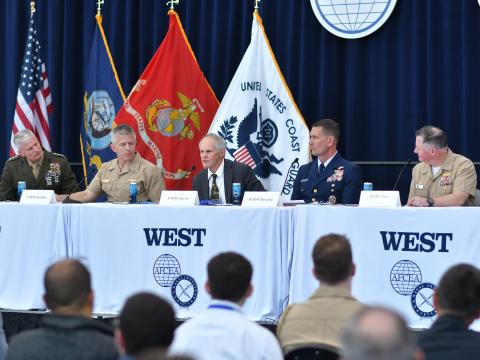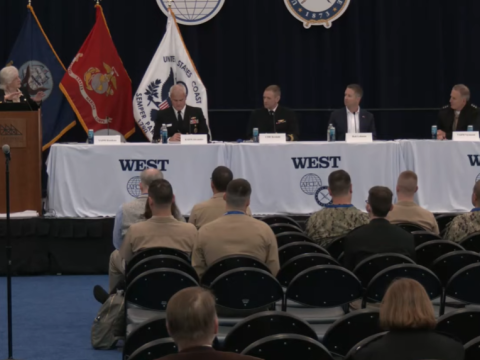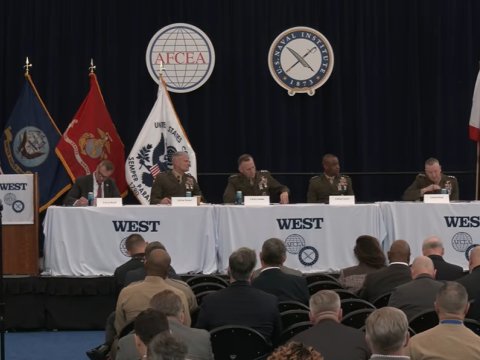A Love Letter to Industry
The U.S. military is relying on the private sector to provide innovation and advanced technologies to face growing threats from adversaries. And companies are bringing the capabilities, investing more and more independent research and development funds, setting up labs for artificial intelligence or other types of technology accelerators.
To get a capability in front of U.S. Air Force officials, in particular, means companies bringing their best. And in the spirit of Valentine’s Day, Department of the Air Force (DAF) Chief Information Officer Venice Goodwine offered a love letter to the defense industrial base while speaking at AFCEA Rocky Mountain Cyberspace Symposium.
As DAF CIO, Goodwine is responsible for a global $17 billion portfolio that supports both the Air Force and U.S. Space Force. She leads three directorates, the Enterprise Information Technology Directorate, the Data and Artificial Intelligence Directorate and the Cybersecurity Directorate.
Goodwine provides oversight of the Air Force’s information technology investment strategy, which includes networking, cloud computing, enterprise policies, data management, digital transformation, information resource management, information technology innovation initiatives and information assurance, according to the DAF.
“I need to give time back to airmen and Guardians,” Goodwine explained. “And what I need to do is make sure that I can modernize faster. I need to also make sure that I can get our airman and Guardians trained where they need to get trained.”
What she loves:
- Problem solving
The CIO loves to see vendors who are prepared and are ready to solve problems and see blind spots, and understand it is more than just selling a product.
“Yesterday, I did our vendor meetings,” she explained. “Thank you vendors. And I will tell you, they came to me and said, ‘Here's where I fit into your enterprise.’ ‘Here's where I think you might need to make adjustments.’ And it wasn't all about selling. I knew they had a product, but they came to me, and what they talked to me about was, ‘here is where I think you have problems, and here are some ways that you can solve them.’ And I know that they have their particular product, but I will then look at theirs and others.
“That, to me, is love, because you understood me.”
- Honesty
Vendors should have frank discussions with the military about what their products actually can or cannot do, the CIO stressed.
“I think it is nice when companies come to me also, and say, ‘I have not met your intent,’ because honesty is important,” Goodwine said. “Because it builds a trust relationship. Love is that communication, that honesty, that trust, and knowing you admit that you're wrong.”
- Innovation
Given the threats the United States is facing, it needs innovation from industry.
“Innovation is important, it is very important,” Goodwine continued. “We, as the government, we put out RFPs [requests for proposals] and we put our RFIs [requests for information] because we have a problem that we want to solve. We really expect your innovation to help us solve it. Don't try to fit it exactly. We're looking for you to be innovative. That just warms my heart when you give me a new way of thinking about the same problem that we've already had.”

And hypothetically—purely hypothetically—if the CIO ever had to break up with you, here are some possible reasons why:
- You don’t know me ...
Understand the Department of the Air Force’s overall priorities as well as its information technology priorities, which involves both the Air Force and Space Force, Goodwine advised. Companies should also understand what the CIO is working on presently and how she is implementing those priorities, and with which military partners she is engaging—whether it is with the Defense Information Systems Agency, the Air Force Research Lab, the chief digital and artificial intelligence officer or another entity.
“If you come to meet with me or my team and have no idea, can you at least read about us, and know who I am and what I’m responsible for, and not my bio. Look at any speech I've given, and you'll see the common themes that I have.
- You don’t like any of my friends ...
Companies should forge their own relationship with other companies, and not wait for the CIO to require this.
“I would say we're breaking up because you don't like any of my friends, because you don't collaborate,” Goodwine shared. “I need you to build and collaborate those relationships and, unbeknownst to me, make those things happen, when that needs to happen, so that we don't have to come in and force that relationship.”
The CIO gave an example, using cloud platforms. An Air Force organization could have identity management in one cloud, data in another cloud and applications in another cloud. And with the Air Force’s Cloud One being a multivendor cloud platform, the service needs solutions across different vendors and platforms. Companies need to pre-position their relationships to enable solutions for this environment, she said.
“Please work together,” the CIO noted. “More than anything, work together.”

- You always ask me for money when you know I don’t have any ...
Companies should understand the federal budget cycle for each fiscal year and know what is happening as far as the appropriations status from Congress. The private sector should also understand that investing in one tool or capability may mean de-vesting in something else.
“Understand where we are in the budget cycle,” the CIO advised. “You know that I am under a CR [continuing resolution], know what a continuing resolution means. And March 14 is coming up soon, what happens if there's another CR? What happens if there's a year-long CR? So, what are you thinking about, vendors, when you come to talk to me about making new investments.
“And the other thing, there is no new money,” she noted. “I promise you, I do not have a CIO money tree that when you come to ask me for money, I just push a button, and money comes out. When you ask me to make an investment, I am going to have to de-invest in something else. And so that's a big decision. It is because I'm accountable, statutorily.”
- There are too many marriage proposals ...
The Department of the Air Force needs to avoid vendor lock, or buying solutions from only one vendor, or solutions that don’t integrate with other vendors’ capabilities.
“What do I mean?” she asked. “I don't want vendor lock. I need diversity in our environment, from a cyber security perspective, from our attack surface. We need a diversity of suppliers.”
Also, vendors need to consider what the adoption of their software or product would mean for the service, what demands it would put on training and for rolling the solution out at scale.
“Have I thought about the schoolhouse when I start to implement or agree to make these investments in new technologies?” Goodwine considered. “Have I worked with my airmen and Guardian functional managers to understand how they are going to incorporate this new technology or training I need?”
- You don't help me solve problems ...
“The last thing is if you don't help me solve problems,” she noted. “And what do I mean—you just bring problems. Please don't bring me a PowerPoint presentation. We have a CTO, Scott Heinman, and he gets more PowerPoint presentations than he wants. So, what I really mean is at the strategic level, if you and I are having a conversation, let's talk about the solutions. You may see some blind spots that I have not seen because you have multiple customers.”
The Rocky Mountain Cyber Symposium is organized by AFCEA International's Rocky Mountain Chapter. SIGNAL Media is the official media of AFCEA International.




Comments